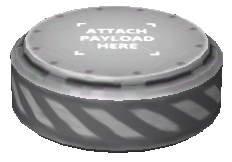Difference between revisions of "AE-FF1 Airstream Protective Shell (1.25m)"
m (Manufacturer) |
m (Header) |
||
| Line 6: | Line 6: | ||
However, the fairing may come in handy during atmospheric entry (especially on [[Eve]]) for payloads that have parts that protrude outside the stack and/or are less heat resistant (e.g. a Rovers wheels), protecting these parts from burning up, while a [[heat shield]] protects the main stack. | However, the fairing may come in handy during atmospheric entry (especially on [[Eve]]) for payloads that have parts that protrude outside the stack and/or are less heat resistant (e.g. a Rovers wheels), protecting these parts from burning up, while a [[heat shield]] protects the main stack. | ||
| − | ==Notes== | + | == Notes == |
Parachutes and photovoltaic arrays can not not be deployed while within fairing displaying the message "Parachute or Solar array can not be deployed while stowed." | Parachutes and photovoltaic arrays can not not be deployed while within fairing displaying the message "Parachute or Solar array can not be deployed while stowed." | ||
Revision as of 23:15, 7 November 2016
| AE-FF1 Airstream Protective Shell (1.25m) | ||
| Fairing by FLOOYD Dynamics Research Labs | ||
| Radial size | Small | |
| Cost | (total) | 300.00 |
| Mass | (total) | 0.075 t |
| Drag | 0.2 | |
| Max. Temp. | 2600 K | |
| Impact Tolerance | 9 m/s | |
| Research | | |
| Unlock cost | 3 000 | |
| Since version | 1.0 | |
| Part configuration | fairingSize1.cfg | |
| Max. radius | 1.50 m | |
| Cost | 6.00 | |
| Mass | 0.010 t / m2 | |
| Testing Environments | ||
| On the surface | Yes | |
| In the ocean | Yes | |
| On the launchpad | Yes | |
| In the atmosphere | Yes | |
| Sub-orbital | Yes | |
| In an orbit | Yes | |
| On an escape | Yes | |
| Docked | No | |
| Test by staging | Yes | |
| Manually testable | No | |
| Packed volume | None | |
The AE-FF1 Airstream Protective Shell (1.25m) is a fairing introduced in version 1.0. The size and shape of the fairing can be edited by the player to fit a specific payload. This can be helpful for protecting payloads with delicate parts that can be easily ripped off during ascent and prevent overheating in the case of very fast craft. It also reduces drag for blunt payloads and held to save on valuable fuel. Upon deploying the AE-FF1 either through the staging diagram or by using the right click menu of the fairings base, the shell will separate into small segments and break off from its base revealing the payload. It is recommended that you deploy the AE-FF1 as soon as a craft exits the atmosphere rendering aerodynamic parts pointless and making the shell dead weight.
However, the fairing may come in handy during atmospheric entry (especially on Eve) for payloads that have parts that protrude outside the stack and/or are less heat resistant (e.g. a Rovers wheels), protecting these parts from burning up, while a heat shield protects the main stack.
Notes
Parachutes and photovoltaic arrays can not not be deployed while within fairing displaying the message "Parachute or Solar array can not be deployed while stowed."
If the payload is loosely secured and parts within the shell are allowed to bend to the point where they should collide with the fairing it will simply phase through due to the fact that the game only registers one collision mesh for an the entire vessel and obviously a collision mesh cannot collide with itself.
One interesting feature is that the shell appears to allow sun light to reach any active solar panels within the shell (as all but one solar panel must be deployed to work, this can only occur with the OX-STAT), provided that the usual requirement for the panel to be facing the sun is met.This is also a possible bug with the part.
Product description
| “ | While the Kerbals at Mission Control were still figuring out how to get their rockets back down to Kerbin safely, the research engineers at FLOOYD were quickly realising that protecting parts on ascent was just as important. Heavy research into two-dimensional-input driven procedural construction was then funded with the hopes of making protective shells for important payloads and interstage areas of the crafts. The protective shells also have the benefit of making the craft more aerodynamic, hopefully saving on precious rocket fuel! The AE-FF1 is the smallest size available from FLOOYD. — FLOOYD Dynamics Research Labs |
” |
Changes
- Moved from Aero to Payload
- Added multiple attachment nodes for payloads
- Changed research node to Advanced Construction (formerly Aerodynamics, change is not mentioned in release notes)
- Initial release
